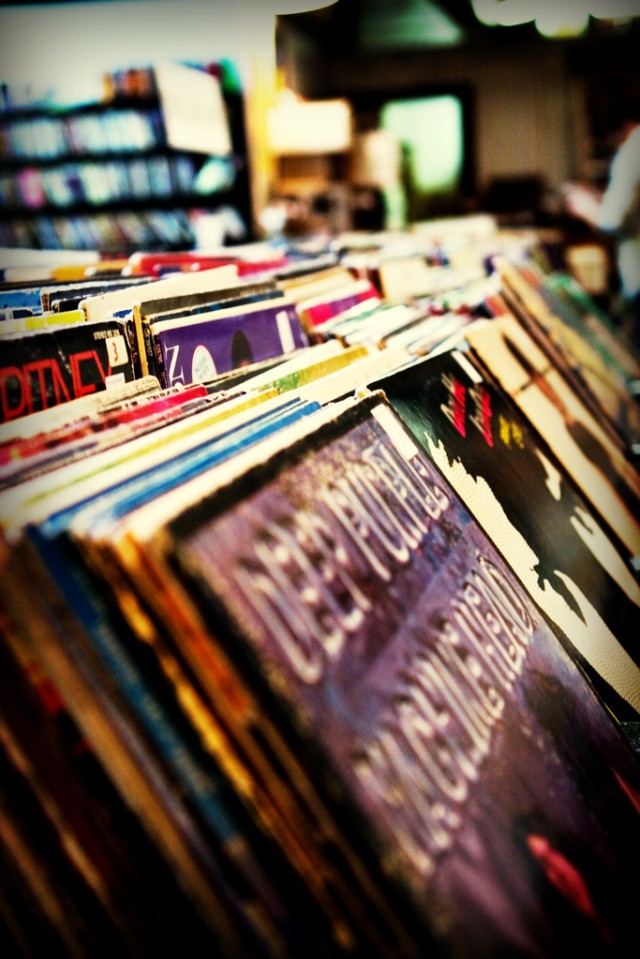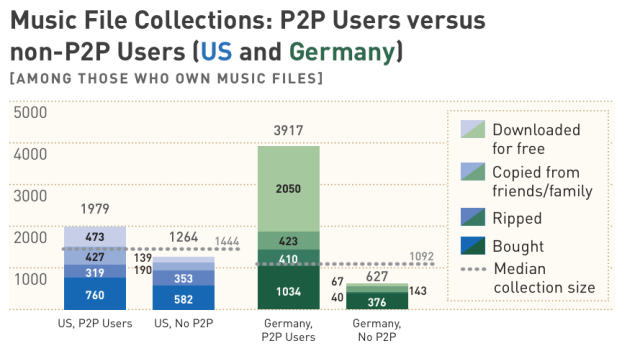New music survey: P2P users buy the most, no one wants disconnection penalties
Google funds the survey, but majority says search should block pirated content.

Among the most significant findings: Americans overwhelmingly oppose the use of disconnection and rate-limiting as penalties for unauthorized file sharing. Also, the survey suggests users of peer-to-peer file-sharing software buy 30 percent more music than those who do not use peer-to-peer software.
The distinction between public and private sharing is central to Americans' thinking about the morality of file sharing. Eight in 10 Americans believe that it's OK to share copyrighted content with family members, and six in 10 extend the same logic to friends. But only a small minority of Americans—between four and 15 percent—say it's reasonable to upload copyrighted content for public consumption, post links to pirated content on Facebook, or sell unauthorized copies of copyrighted materials.
Unsurprisingly, young people tend to be friendlier to copying than older Americans. For example, 76 percent of Americans under 30 say it's reasonable to share content with friends, while only 51 percent of those over 65 think so. Only 13 percent of American Internet users use peer-to-peer file-sharing software overall, but 20 percent of adults under 30 do so.
While the survey was commissioned by Google, not all of the results will be to the Mountain View company's liking. A slight majority—53 percent—of Americans believe that search engines should "be required to block links to pirated music and videos online." Only 42 percent disagreed with that statement.
File sharers buy more music
 There is a perennial debate in tech policy circles about whether
peer-to-peer file sharing reduces the market for music and other
creative content. It's obvious why those who download pirated files from
peer-to-peer networks might purchase less content through legitimate
channels. But some scholars argue file sharing can make it easier for
fans to find new content they like, broadening their tastes and causing
them to buy more music in the long run.
There is a perennial debate in tech policy circles about whether
peer-to-peer file sharing reduces the market for music and other
creative content. It's obvious why those who download pirated files from
peer-to-peer networks might purchase less content through legitimate
channels. But some scholars argue file sharing can make it easier for
fans to find new content they like, broadening their tastes and causing
them to buy more music in the long run.The survey provides some limited support for the view that file sharing promotes, rather than hinders, legitimate music purchases. The average American on a peer-to-peer network has a music library of almost 2000 songs. Of these, 760 (38 percent) are reported to be legitimately purchased. In contrast, those who say they are not P2P users (but do collect digital music files) have an average library size of 1300 songs. Of those, 582 (roughly 45 percent) were purchased from legitimate sources. Most of the others were ripped from CDs or copied from friends and family.
Of course, correlation is not causation. It's possible, for example, the most avid music fans are also the most likely to be drawn to peer-to-peer networks. Perhaps without those networks they would have purchased even more music from legitimate services. But at a minimum, it's an important reminder many heavy P2P users are also heavy consumers of music from legitimate channels.
Cultural differences
Karaganis and Renkema commissioned surveys in both the United States and Germany, allowing comparisons to be drawn between the two countries. The survey results were broadly similar between the countries, with a few notable differences. Germans generally express higher support for efforts to enforce copyright. For example, 59 percent of Germans believe that unauthorized downloading of a song or movie should be punishable, while just 52 percent of Americans agree. However, Germans are privacy zealots, with 71 percent opposing Internet monitoring to prevent infringement, two points higher than Americans.The survey results also suggest Germans have been slower to adopt new technology than Americans. In the United States in 2011, 14 percent of consumers had an eBook reader and 10 percent of consumers had a tablet. In Germany, the corresponding figures were 2 percent and 4 percent. There is also a large disparity in pay television subscriptions.
Physical formats are still king in Germany. An impressive 82 percent of music revenue is attributable to physical formats such as the CD. In contrast, physical formats now account for less than half of recorded music revenue in the United States.
Because Germany has a more extensive system of publicly-funded television content, only 49 percent of Germans subscribe to a pay TV service, compared with 82 percent of Americans. In America 13 percent of consumers (including 29 percent of those under 30) get "most or all" of their music from a streaming service such as Pandora or Spotify. Only 2 percent of Germany consumers (9 percent of those under 30) rely on a streaming music service.



No comments:
Post a Comment